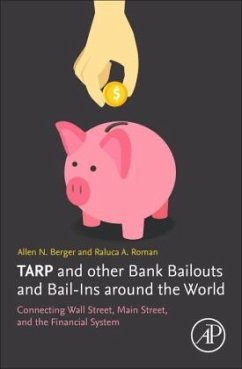Financial crises are recurring phenomena that result in the financial distress of systemically important banks, making it imperative to understand how to best respond to such crises and their consequences. Two policy responses became prominent for dealing with these distressed institutions since the last Global Financial Crisis: bailouts and bail-ins. The main questions surrounding these responses touch everyone: Are bailouts or bail-ins good for the financial system and the real economy? Is it essential to save distressed financial institutions by putting taxpayer money at risk in bailouts, or is it better to use private money in bail-ins instead? Are there better options, such as first lines of defense that help prevent such distress in the first place? Can countercyclical prudential and monetary policies lessen the likelihood and severity of the financial crises that often bring about this distress? Through careful analysis, authors Berger and Roman review and critically assess the extant theoretical and empirical research on many resolution approaches and tools. Placing special emphasis on lessons learned from one of the biggest bailouts of all time, the Troubled Asset Relief Program (TARP), while also reviewing other programs and tools, TARP and Other Bank Bailouts and Bail-Ins around the World sheds light on how best to protect the financial system on Wall Street and the real economy on Main Street.
"Analyzes theoretical and empirical research evidence on the Troubled Asset Relief Program (TARP) in the United States and other bank bailouts and bail-ins in the United States and around the world, assessing the important costs and benefits of these programs in order to suggest potential policy implications for the future." --
"It is now over twelve years since the global financial crisis and a rich panoply of financial sector rescue measures being unleashed to arrest the Great Recession. Several parts of the global economy have not yet fully recovered or found the right policy mix to restore growth on a sustainable basis while maintaining financial stability. This book by Allen Berger and Raluca Roman provides a timely taxonomy and assessment of these rescue measures, organizing them around a conceptual framework as well as parsing systematically through the growing body of empirical evidence on their efficacy. I recommend it highly to all academics, policy makers and practitioners." -Viral V. Acharya, C.V.Starr Professor of Economics, Department of Finance, New York University Stern School of Business
"The financial distress of systemically important banks that typically accompany financial crises often results in recessions and other significant damages to the real economy, making policy responses of first-order importance. This book provides a comprehensive, research-based analysis and review of bank bailouts, bail-ins, and other resolution approaches to deal with the financial distress and avoid the economic damages. The authors of the book, Allen Berger and Raluca Roman, have written a significant body of relevant research, and are ideally positioned to provide this analysis and review. The authors provide an enlightening discussion of the benefits and costs of a number of resolution approaches for systemically important banks in financial distress, including bailouts and bail-ins. They also cover first lines of defense and countercyclical policies to prevent such distress in the first place. The book is an indispensable guide for researchers, policymakers, bank managers, analysts, and students." --Manju Puri, J.B. Fuqua Professor of Finance, Department of Finance, Duke University Fuqua School of Business
"The global financial crisis caused policy interventions at a level and of an intensity not seen before during our lifetimes, in particular in the area of banking stability. However, more than ten years later we are still lacking the essential holistic overview and in-depth analysis of the dramatic bank bailouts and bail-ins that took place around the world, including in the US. Well here it is. By a team of top scholars who not only have produced most of the relevant academic research on this topic, but also have the necessary insiders` eye for the deep trade-offs involved and for the minutiae of the actual policymaking that took place: A book that undoubtedly will withstand time and become the classic source to turn to when pondering bank bailouts/-ins in the near or distant future." --Steven Ongena, Professor of Banking in the Department of Banking and Finance at the University of Zurich, Senior chair at the Swiss Finance Institute, Research Professor at KU Leuven, and Research Fellow in Financial Economics of CEPR
"It is now over twelve years since the global financial crisis and a rich panoply of financial sector rescue measures being unleashed to arrest the Great Recession. Several parts of the global economy have not yet fully recovered or found the right policy mix to restore growth on a sustainable basis while maintaining financial stability. This book by Allen Berger and Raluca Roman provides a timely taxonomy and assessment of these rescue measures, organizing them around a conceptual framework as well as parsing systematically through the growing body of empirical evidence on their efficacy. I recommend it highly to all academics, policy makers and practitioners." -Viral V. Acharya, C.V.Starr Professor of Economics, Department of Finance, New York University Stern School of Business
"The financial distress of systemically important banks that typically accompany financial crises often results in recessions and other significant damages to the real economy, making policy responses of first-order importance. This book provides a comprehensive, research-based analysis and review of bank bailouts, bail-ins, and other resolution approaches to deal with the financial distress and avoid the economic damages. The authors of the book, Allen Berger and Raluca Roman, have written a significant body of relevant research, and are ideally positioned to provide this analysis and review. The authors provide an enlightening discussion of the benefits and costs of a number of resolution approaches for systemically important banks in financial distress, including bailouts and bail-ins. They also cover first lines of defense and countercyclical policies to prevent such distress in the first place. The book is an indispensable guide for researchers, policymakers, bank managers, analysts, and students." --Manju Puri, J.B. Fuqua Professor of Finance, Department of Finance, Duke University Fuqua School of Business
"The global financial crisis caused policy interventions at a level and of an intensity not seen before during our lifetimes, in particular in the area of banking stability. However, more than ten years later we are still lacking the essential holistic overview and in-depth analysis of the dramatic bank bailouts and bail-ins that took place around the world, including in the US. Well here it is. By a team of top scholars who not only have produced most of the relevant academic research on this topic, but also have the necessary insiders` eye for the deep trade-offs involved and for the minutiae of the actual policymaking that took place: A book that undoubtedly will withstand time and become the classic source to turn to when pondering bank bailouts/-ins in the near or distant future." --Steven Ongena, Professor of Banking in the Department of Banking and Finance at the University of Zurich, Senior chair at the Swiss Finance Institute, Research Professor at KU Leuven, and Research Fellow in Financial Economics of CEPR








